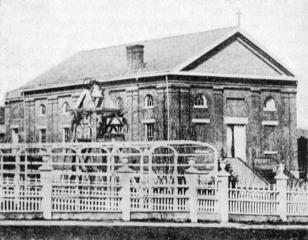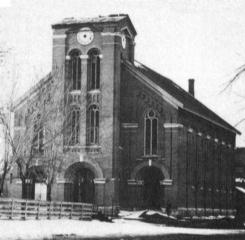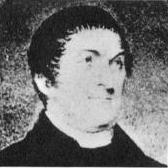Saturday Postcard 187: Stories of St. Mary's
 l l
St.Mary's Catholic Church as completed in 1843 sported a storied bell in the churchyard beside it. The current 1869 church was built around this one which then was demolished inside and carried out piece by piece. The image is digitally enhanced. |
 The 1869 St. Mary's Catholic Church at Jefferson and Linn streets in Iowa City before a 140-foot steeple was added in 1874. |
|
 Rev. Samuel Mazzuchelli |
By Bob
Hibbs Presbyterians aren't sole proprietors of bell stories in Iowa City, for St. Mary's Church has its own to tell, as well as tales of clocks, schools and erecting a new church surrounding its old one. The senior local Roman Catholic parish was organized in 1840 by such historic pioneer families as Clark, Dunkel, Forwald, Freeman, Gaffney, Gross, Haverstrah, Hotz, McDonald and McGinnes. The first building was completed in 1842 on the Jefferson-Linn corner which still serves the parish today. |
|
|
Iowa
Territory offered congregations free Iowa City sites subject to putting up a
$3,000 structure within three years. While church histories indicate
Rev. Samuel Mazzuchelli (1806-1864) paid $2,000 for its
two-lot site, other records indicate it came by grant. In addition,
$2,000 would have been an exorbitant price since lots typically sold for about The first local Catholic service was in the Ferdinand Haberstroh home located in what is now a courtyard on the north side of the 10 block of East Jefferson Street between the University of Iowa's Pappajohn Business Building and Gilmore Hall. The mass was recited by Father Mazzuchelli, an Italian priest credited with helping design and build some two dozen Catholic churches in the upper Midwest before his 1864 death in southwest Wisconsin. A dozen additional parishes claim Father Mazzuchelli as their founder. He also is falsely credited with designing Old Capitol in Iowa City, an assertion long ago discredited in favor of the actual architect, John Francis Rague, who also designed the original Illinois capitol. Although St. Mary's parish increasingly consisted of Germans, Irish and Bohemians, its early priests all were Frenchmen, influenced largely by French native Mathias Loras, bishop of Dubuque. The first local priest served but two years, yet during that time Rev. Anthony Godfert initiated school in the church basement, and paid $100 for 80 acres to establish St. Joseph's Cemetery adjacent to the Oakland municipal burying grounds. Both events remain important to local Catholics 160 years later. The parish's fourth priest, Rev. Mathias Hannon, innocently created a bell story in 1855 by accepting mistaken delivery of a bell made for a similarly named parish in Sauk City, Wisconsin. A boastful parishioner told Bishop Loras he had donated the bell, giving false authenticity to its delivery. Some months after a 24-foot bell tower was added beside the church and the bell consecrated, the story unraveled, the supposed giver disappeared and a quick fund drive financed purchase of a replacement bell for Sauk City. In addition to existing local parishes of 1873 St. Patrick, 1893 St. Wenceslaus and 1962 St. Thomas Moore, the English-language St. Mary's spawned a short-lived German-language parish called St. Francis Xavier in 1862 which built a church at Brown and Johnson streets in north-central Iowa City. After the parish ceased functioning in 1867, a new larger St. Mary's building was soon under construction. The Xavier building and its contents burned in 1869 just as the new St. Mary's facility was being dedicated. That new facility has since undergone major renovations in 1907, 1941 and 1983. In 1885 a 17-bell carillon was installed atop St. Mary's by Iowa City jeweler Joseph Barborka, who also hand-crafted the parts and installed the working steeple clock. Barborka, who played hymns on the chimes, also hand-made and installed clocks on the belfry of the 1881 City Hall. Those parts are now visible in the ground-level entry vestibule of the municipal parking ramp beside Cottage Bakery at 14 South Linn Street. Next Saturday: North Hall on UI's Pentacrest Campus. Bob
Hibbs collects local postcards and researches history related to them. Return to Postcards Index |